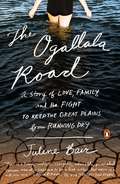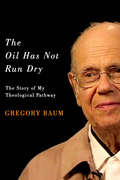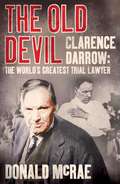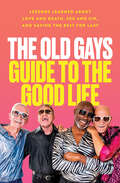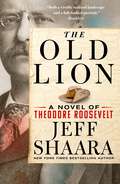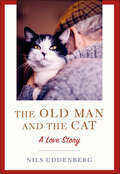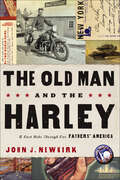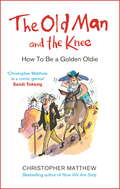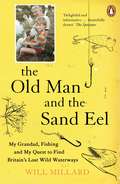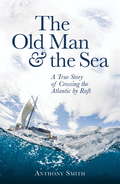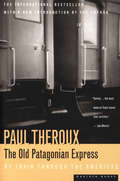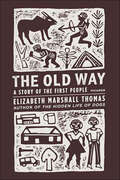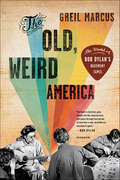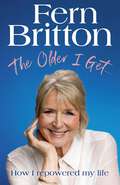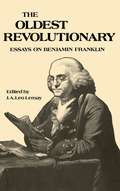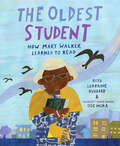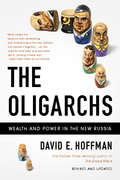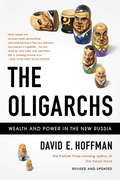- Table View
- List View
The Ogallala Road: A Story of Love, Family, and the Fight to Keep the Great Plains from Running Dry
by Julene BairA love affair unfolds as crisis hits a family farm on the high plainsJulene Bair has inherited part of a farming empire and fallen in love with a rancher from Kansas's beautiful Smoky Valley. She means to create a family, provide her son with the father he longs for, and preserve the Bair farm for the next generation, honoring her own father's wish and commandment, "Hang on to your land!" But part of her legacy is a share of the ecological harm the Bair Farm has done: each growing season her family--like other irrigators--pumps over two hundred million gallons out of the Ogallala aquifer. The rapidly disappearing aquifer is the sole source of water on the vast western plains, and her family's role in its depletion haunts her. As traditional ways of life collide with industrial realities, Bair must dramatically change course.Updating the territory mapped by Jane Smiley, Pam Houston, and Terry Tempest Williams, and with elements of Cheryl Strayed's Wild, The Ogallala Road tells a tale of the West today and points us toward a new way to love both the land and one another.
The Ohio Gang: The World of Warren G. Harding
by Charles L. MeeWhen Warren G. Harding entered the White House in 1921, he surrounded himself with men he had known during his climb up the political ladder. Many were cronies involved in the bootlegging trade. Some were slick businessmen who made millions through kickbacks and bribes. This book describes the men and women who revolved around Harding, and the web of intrigue which has led historians to consider him one of the worst presidents in U.S. history.
The Oil Has Not Run Dry: The Story of My Theological Pathway
by Gregory BaumBorn to a Jewish mother and Protestant father in 1923 Berlin, Gregory Baum has devoted his career to a humanistic approach to Catholicism. In The Oil Has Not Run Dry, Baum shares recollections about his lifelong commitment to theology, his atypical views, and his evolving understanding of the Catholic Church’s message. Baum reflects on his groundbreaking work with the Second Vatican Council (1962-65) and how it helped to open the Church to a new understanding of outsiders - one that advocated cooperation with world religions in support of peace and justice and respected secular philosophies committed to truth and social solidarity. Later embracing Latin American liberation theology, he became a leading thinker of the Catholic Left in Canada, adopting radical positions that initially earned support from Canadian bishops in the 1970s. Diverging from official Catholic doctrines regarding women and sexual ethics, Baum eventually left the priesthood, but continued to teach theology and remained active in the Church. The Oil Has Not Run Dry also discusses the contrast between Catholicism in Quebec and English-speaking North America, and the ways in which Baum sees Quebec’s culture as more marked by social solidarity. This significant difference has inspired his own writings which present the original development of Catholic thought in Quebec to an English-speaking readership.
The Oil Has Not Run Dry: The Story of My Theological Pathway (Footprints Series #23)
by Gregory BaumBorn to a Jewish mother and Protestant father in 1923 Berlin, Gregory Baum devoted his career to a humanistic approach to Catholicism. In The Oil Has Not Run Dry, Baum shares recollections about his lifelong commitment to theology, his atypical views, and his evolving understanding of the Catholic Church’s message. Baum reflects on his groundbreaking work with the Second Vatican Council (1962-65) and how it helped to open the Church to a new understanding of outsiders - one that advocated cooperation with world religions in support of peace and justice and respected secular philosophies committed to truth and social solidarity. Later embracing Latin American liberation theology, he became a leading thinker of the Catholic Left in Canada, adopting radical positions that initially earned support from Canadian bishops in the 1970s. Diverging from official Catholic doctrines regarding women and sexual ethics, Baum eventually left the priesthood, but continued to teach theology and remained active in the Church. The Oil Has Not Run Dry also discusses the contrast between Catholicism in Quebec and English-speaking North America, and the ways in which Baum sees Quebec's culture as more marked by social solidarity. This significant difference has inspired his own writings, which present the original development of Catholic thought in Quebec to an English-speaking readership.
The Old Devil
by Donald McraeClarence Darrow was one of the most legendary and influential trial lawyers the world has ever seen. Famous for his ability to turn seemingly unwinnable cases his way through his oratory and his uncanny skill at reading the mood of a jury, he was a man whose work inspired impassioned campaigns against the death penalty as well as lavish Hollywood movies. Now award-winning writer Donald McRae revisits the three greatest trials which secured Darrow's near-mythic reputation and brings them vividly to life. The public themes which Darrow confronted still resonate powerfully today: sex and murder, religion and science, racism, the media and the law. Written with great intimacy, drama and immediacy, this is a sweeping story which offers piercing insight into one of the most towering and controversial personalities of the twentieth century.
The Old Gays Guide to the Good Life: Lessons Learned About Love and Death, Sex and Sin, and Saving the Best for Last
by Robert Reeves Bill Lyons Mick Peterson Jessay MartinFrom America’s most beloved foursome—the TikTok sensation @oldgays—a book of unexpected aspirational advice and inspirational stories drawn from their decades of living, from pre-Stonewall to the rise of the LGBTQ+ movement to gay marriage and beyond.Ranging in age from sixty-seven to eighty, Mick, Jessay, Robert, and Bill are the real-life Golden Girls of the social media era, a quartet of old gays whose hard-won confidence and awesome authenticity have taken the culture by storm. They are America’s queens—and, more important, they are survivors whose lives have been transformed by sweeping cultural change. In this fabulously fun and entertaining book, they share their stories—humorous, heartbreaking, shocking, and profound tales that only older gay men can tell. It was their generation that was devastated by AIDS, a health crisis that deprived us of so many brilliant, creative lives, including many of their friends.In this delightful group memoir, Mick, Jessay, Robert, and Bill tell all about their lives, revealing who they are beyond TikTok, where they came from, and how they found one another. They offer their collective wisdom on a rainbow of topics, including coming out, sex, gay liberation, gay marriage, AIDS, aging, and saving the best act for last. Outrageous and hilarious, refreshingly earnest and unfiltered, engaging and insightful, they’ve been through it all—harassment, divorce, depression, bankruptcy, even near-death experiences. Between the four of them, there’s not much of life they haven’t seen or done, and now they dish on everything from fitness and fabulous dinner parties to church and orgies.An intimate and moving portrait of four friends who have experienced the good, the bad, and the ugly, and are still looking forward to the best that is yet to come, The Old Gays Guide to the Good Life is a celebration of lives lived to the fullest—sometimes against all odds—a lesson for all of us that age is just a number and that getting older can be audaciously fun.
The Old Gringo
by Carlos Fuentes Margaret Sayers PedenThe story renders the life of Ambrose Bierce, an American writer and journalist. It covers the topics of colonialism, the relationship between US and Mexico, and love beyond boundaries.
The Old Lion: A Novel of Theodore Roosevelt
by Jeff ShaaraIn one of his most accomplished, compelling novels yet, acclaimed New York Times bestseller Jeff Shaara accomplishes what only the finest historical fiction can do - he brings to life one of the most consequential figures in U.S. history - Theodore Roosevelt - peeling back the many-layered history of the man, and the country he personified. From the mid-nineteenth century to the early twentieth century, from the waning days of the rugged frontier of a young country to the emergence of a modern, industrial nation exerting its power on the world stage, Theodore Roosevelt embodied both the myth and reality of the country he loved and led. From his upbringing in the rarefied air of New York society of the late 19th century to his time in rough-and-tumble world of the Badlands in the Dakotas, from his rise from political obscurity to Assistant Secretary of the Navy, from national hero as the leader of the Rough Riders in the Spanish-American War to his accidental rise to the Presidency itself, Roosevelt embodied the complex, often contradictory, image of America itself.In gripping prose, Shaara's The Old Lion tells the story of the man who both defined and created the modern United States. “Shaara deftly weaves a growing intensity that explodes on the pages.” – Bookreporter.com on To Wake the Giant.”
The Old Man and the Cat: A Love Story
by Nils UddenbergThe Old Man and The Cat is a story of how Nils Uddenberg, retired Professor of Psychology became a beloved cat-owner even though he had never wanted a pet of any kind. One winter morning the author discovered a cat—whom he would later find was homeless—sitting outside his bedroom window, staring at him with big yellow eyes. Slowly but surely the cat worked itself into his life.This award-winning writer who has a background in psychology could not stop himself from going deeper into the cat's inner life. Does she have a sense of humor? Is it possible to attach human feelings to her? And the trickiest question of all: Is our little cat actually interested in our attachment to her? With humor and self-awareness, Nils describes how his existence changed after the cat moved into his house. The feelings she stirs up are a surprise to him and he quickly finds himself falling in love with this speckled grey-brown little lady.
The Old Man and the Harley: A Last Ride Through Our Fathers' America
by John J. NewkirkRide with a father and his son on an amazing journey through America's past. In the summer of 1939, with the nation balanced between the Great Depression and the gathering winds of war, young Jack Newkirk set off on a rickety Harley to see both the New York and San Francisco World's Fairs. He had no way of knowing it was to e the autumn of his youth, and that his entire generation would soon be thrust into the most devastating conflict in history.Seven decades later, author John J. Newkirk retraces this epic ride with his father, Jack, in a silent hope the old soldier will still be proud of the America he fought for. Each mile brings discovery as the author learns of his namesake, the heroic Squadron Leader of the legendar Flying Tigers, and of his father's life on the road and in the jungles of the South Pacific during World War II.The result is quintessential Americana, a sweeping portrait of the grit, guts, ingenuity, and sacrifice that defined a nation, and a timely lesson from the Greatest Generation on how we can overcome our most pressing challenges and reclaim the American Dream.
The Old Man and the Knee: How to be a Golden Oldie
by Christopher MatthewDaunted by the prospect of old age? Fearful of becoming a silly old fool? 'No need,' says Christopher Matthew.He has just hit eighty. He plays golf; walks the dog; has all his own hair; doesn't need a hearing aid, and no one ever stands up for him on crowded buses and tubes. By his own lights a late middle ager who intends to remain so.No one likes the idea of getting old, but in this wry, thoughtful and very funny guide to life in the last lane, the author of the million-selling Now We Are Sixty will surely persuade all late middle agers that they have a lot more to look forward to than they might imagine.
The Old Man and the Knee: How to be a Golden Oldie
by Christopher MatthewDaunted by the prospect of old age? Fearful of becoming a silly old fool? 'No need,' says Christopher Matthew.He has just hit eighty. He plays golf; walks the dog; has all his own hair; doesn't need a hearing aid, and no one ever stands up for him on crowded buses and tubes. By his own lights a late middle ager who intends to remain so.No one likes the idea of getting old, but in this wry, thoughtful and very funny guide to life in the last lane, the author of the million-selling Now We Are Sixty will surely persuade all late middle agers that they have a lot more to look forward to than they might imagine.
The Old Man and the Sand Eel
by Will Millard'A wonderfully fluent account of how the strange magic of water and the beings that inhabit it can enchant and intoxicate' Chris YatesGrowing up on the Cambridgeshire Fens, Will Millard never felt more at home than when he was out with his granddad on the riverbank, whiling away the day catching fish. As he grew older his competitive urge to catch more and bigger fish led him away from that natural connection between him, his grandfather and the rivers of his home. That is, until the fateful day he let a record-breaking sand eel slip through his fingers and he knew that he had lost the magic of those days down by the river, and that something had to change. The Old Man and the Sand Eel is at its heart the story of three generations of men trying to figure out what it is to be a man, a father and a fisherman. It plots Will's scaly stepping stones back to his childhood innocence, when anything was possible and the wild was everywhere.***'[Will Millard] is a master wordsmith and his first book is a joyful testament to that' Isabelle Broom, Heat'[Will Millard] writes with a genuine sense of humility (...) humour and reflection' Kevin Parr, Countryfile 'Delightful and informative (...) beautifully drawn (...)The Old Man and The Sand Eel will be enjoyed by anyone who loves the challenge and mystery of baiting a hook and plopping it into the water' Spectator'This is post-modern nature writing that embraces beauty where it finds it and marvels at nature's tenacity (...) But there's more here than just fish. This is also a book about growing up, about how to retain a connection with those who raised you while forging your own identity - what to keep and what to discard. And it's about men. The strong surges of emotion that both draw them together and keep them apart, and the shared pastimes which recognise that intimacy and meaning aren't always accompanied by words' Olivia Edward, Geographical
The Old Man and the Sea: A True Story of Crossing the Atlantic by Raft
by Anthony SmithOctogenarian Anthony Smith's journey was originally inspired by both the Kontiki Expedition of Thor Heyerdahl (who he knew) and the incredible story of the survivors of a 1940 boat disaster, who spent 70 days adrift in the Atlantic, eventually reaching land emaciated and close to death. While this might sound like a voyage no-one would wish to emulate, to octogenarian Anthony Smith it sounded like an adventure, and he placed a typically straightforward advertisement in the Telegraph that read "Fancy rafting across the Atlantic? Famous traveller requires 3 crew. Must be OAP. Serious adventurers only." In his inimitable style, Smith details their voyage and the hardships they endured with a matter-of-fact air that makes his story seem all the more impressive. His advanced age allows him a wider perspective not only on the journey but on life itself, and his never-say-die attitude to the difficulty of the journey is inspirational. 'Old men ought to be explorers' said T.S. Eliot, and this book certainly gives a compelling argument in his favour. It is both a great story (a huge storm on the final night of the voyage almost wrecked them on a reef) and a call to action for the older generation - do not go quietly, says Anthony Smith, but seek out adventure as long as you are able.
The Old Man and the Sea: A True Story of Crossing the Atlantic by Raft
by Anthony SmithOctogenarian Anthony Smith's journey was originally inspired by both the Kontiki Expedition of Thor Heyerdahl (who he knew) and the incredible story of the survivors of a 1940 boat disaster, who spent 70 days adrift in the Atlantic, eventually reaching land emaciated and close to death. While this might sound like a voyage no-one would wish to emulate, to octogenarian Anthony Smith it sounded like an adventure, and he placed a typically straightforward advertisement in the Telegraph that read "Fancy rafting across the Atlantic? Famous traveller requires 3 crew. Must be OAP. Serious adventurers only." In his inimitable style, Smith details their voyage and the hardships they endured with a matter-of-fact air that makes his story seem all the more impressive. His advanced age allows him a wider perspective not only on the journey but on life itself, and his never-say-die attitude to the difficulty of the journey is inspirational. 'Old men ought to be explorers' said T.S. Eliot, and this book certainly gives a compelling argument in his favour. It is both a great story (a huge storm on the final night of the voyage almost wrecked them on a reef) and a call to action for the older generation - do not go quietly, says Anthony Smith, but seek out adventure as long as you are able.
The Old Patagonian Express: By Train Through the Americas (Penguin Modern Classics Ser.)
by Paul TherouxThe acclaimed travel writer journeys by train across the Americas from Boston to Patagonia in this international bestselling travel memoir.Starting with a rush-hour subway ride to South Station in Boston to catch the Lake Shore Limited to Chicago, Paul Theroux takes a grand railway adventure first across the United States and then south through Mexico, Central America, and across the Andes until he winds up on the meandering Old Patagonian Express steam engine. His epic commute finally comes to a halt in a desolate land of cracked hills and thorn bushes that reaches toward Antarctica. Along the way, Theroux demonstrates how train travel can reveal &“"the social miseries and scenic splendors&” of a continent. And through his perceptive prose we learn that what matters most are the people he meets along the way, including the monologuing Mr. Thornberry in Costa Rica, the bogus priest of Cali, and the blind Jorge Luis Borges, who delights in having Theroux read Robert Louis Stevenson to him.
The Old Way: A Story of the First People
by Elizabeth Marshall ThomasOne of our most influential anthropologists reevaluates her long and illustrious career by returning to her roots—and the roots of life as we know itWhen Elizabeth Marshall Thomas first arrived in Africa to live among the Kalahari San, or bushmen, it was 1950, she was nineteen years old, and these last surviving hunter-gatherers were living as humans had lived for 15,000 centuries. Thomas wound up writing about their world in a seminal work, The Harmless People (1959). It has never gone out of print.Back then, this was uncharted territory and little was known about our human origins. Today, our beginnings are better understood. And after a lifetime of interest in the bushmen, Thomas has come to see that their lifestyle reveals great, hidden truths about human evolution.As she displayed in her bestseller, The Hidden Life of Dogs, Thomas has a rare gift for giving voice to the voices we don't usually listen to, and helps us see the path that we have taken in our human journey. In The Old Way, she shows how the skills and customs of the hunter-gatherer share much in common with the survival tactics of our animal predecessors. And since it is "knowledge, not objects, that endure" over time, Thomas vividly brings us to see how linked we are to our origins in the animal kingdom.The Old Way is a rare and remarkable achievement, sure to stir up controversy, and worthy of celebration.
The Old, Weird America: The World of Bob Dylan's Basement Tapes
by Greil MarcusPreviously published as Invisible Republic and already considered a classic of modern American cultural criticism, this is an updated edition of Greil Marcus's acclaimed book on the secret music made by Bob Dylan and the Band in 1967, which introduced a phrase that has become part of the culture: "the old, weird America."Marcus's widely acclaimed book is about the secret music (the so-called "Basement Tapes") made by Bob Dylan and the Band while in seclusion in Woodstock, New York, in 1967 a folksy yet funky, furious yet hilarious music that remains as seductive and baffling today as it was more than half a century ago.As Mark Sinker observed in The Wire: "Marcus's contention is that there can be found in American folk a community as deep, as electric, as perverse, and as conflicted as all America, and that the songs Dylan recorded out of the public eye, in a basement in Woodstock, are where that community as a whole gets to speak." But the country mapped out in this book, as Bruce Shapiro wrote in The Nation, "is not Woody Guthrie's land for made for you and me . . . It's what Marcus calls 'the old, weird America.'" This odd terrain, this strange yet familiar backdrop to our common cultural history--which Luc Sante (in New York magazine) termed the "playground of God, Satan, tricksters, Puritans, confidence men, illuminati, braggarts, preachers, anonymous poets of all stripes"--is the territory that Marcus has discovered in Dylan's most mysterious music. And his analysis of that territory "reads like a thriller" (Ken Tucker, Entertainment Weekly) and exhibits "a mad, sparkling brilliance" (David Remnick, The New Yorker) throughout. This special edition includes a new introduction, an updated discography, and never-before-seen photographs of the legendary recording sessions.“This book is terminal, goes deeply into the subconscious and plows through that period of time like a rake. Greil Marcus has done it again.” -- Bob Dylan
The Older I Get…: How I repowered my life
by Fern Britton‘I didn’t know it at the time, as I didn’t have a word for it then, but I’ve repowered several times in my life. Leaving home in my teens, changing careers from theatre to TV to author, battling my way out of the dark pit of postnatal depression and rebuilding my life as a single mother after the end of my marriage. All these were hard. All of them taught me big lessons. Perhaps the biggest of these was that I can do it. And so can you.’Fern had recently entered her 60s when a series of life-altering events threw her into the eye of the storm. Both her parents passed away, her 20-year marriage ended, and the pandemic was looming.Faced with an uncertain future, Fern decided that if she wanted to start over, now was the time. She moved to Cornwall, where she reconnected with her true self and instead of fearing getting older, she chose to create a glorious new life full of friendship, fun and adventure.Fern explores the joy and challenges of aging with warmth and humour. She reflects back on all she has learnt, from enduring tough times to embracing new opportunities and learning how to be kinder to herself. This wasn’t a moment of empowerment, for that would suggest she never had any power to begin with. As women, we often put our needs aside, and she feels strongly that it’s time for us to repower and rediscover our happiness.In The Older I Get, join Fern as she candidly shares her experiences of grief and loss, rebuilding confidence and exploring new passions, as well as the importance of finding friends you can put the world to rights with over a couple of Cosmos.
The Oldest Revolutionary: Essays on Benjamin Franklin
by J. A. LemayBenjamin Franklin is the model American of an America that we have created. But if we can go beyond our preconceptions of Franklin and the 1776 and 1976 image of America, we can learn something of the truth, as well as the art, of his writings. The essays in this volume evaluate Franklin as a printer, publicist, and travel writer; they probe the structure, style, and organization of his most famous literary works, and assess his place in intellectual history. Taken together, the essays provide an overview of Franklin's attitude, purpose, and significance as a man and as a writer for his own time and for ours; taken separately, they provide valuable insights into what Franklin was and wrote. The first group of essays deals with Franklin's life. The second group of essays treats Franklin as a writer. The last two essays concern Franklins reputation and influence.
The Oldest Student: How Mary Walker Learned to Read
by Rita Lorraine HubbardImagine learning to read at the age of 116! Discover the true story of Mary Walker, the nation's oldest student who did just that, in this picture book from a Caldecott Honor-winning illustrator and a rising star author. In 1848, Mary Walker was born into slavery. At age 15, she was freed, and by age 20, she was married and had her first child. By age 68, she had worked numerous jobs, including cooking, cleaning, babysitting, and selling sandwiches to raise money for her church. At 114, she was the last remaining member of her family. And at 116, she learned to read. From Rita Lorraine Hubbard and rising star Oge More comes the inspirational story of Mary Walker, a woman whose long life spanned from the Civil War to the Civil Rights Movement, and who--with perseverance and dedication--proved that you're never too old to learn.
The Oligarchs
by David E. HoffmanIn this saga of brilliant triumphs and magnificent failures, David E. Hoffman, the former Moscow bureau chief for the Washington Post, sheds light on the hidden lives of Russia's most feared power brokers: the oligarchs. Focusing on six of these ruthless men- Alexander Smolensky, Yuri Luzhkov, Anatoly Chubais, Mikhail Khodorkovsky, Boris Berezovsky, and Vladimir Gusinsky-Hoffman shows how a rapacious, unruly capitalism was born out of the ashes of Soviet communism.
The Oligarchs: Wealth And Power In The New Russia
by David HoffmanIn this saga of brilliant triumphs and magnificent failures, David E. Hoffman, the former Moscow bureau chief for the Washington Post, sheds light on the hidden lives of Russia’s most feared power brokers: the oligarchs. Focusing on six of these ruthless men- Alexander Smolensky, Yuri Luzhkov, Anatoly Chubais, Mikhail Khodorkovsky, Boris Berezovsky, and Vladimir Gusinsky-Hoffman shows how a rapacious, unruly capitalism was born out of the ashes of Soviet communism.
The Oligarchs: Wealth and Power in the New Russia
by David E. HoffmanDavid Hoffman, former Moscow bureau chief forThe Washington Post,sheds light onto the hidden lives of Russia's most feared power brokers: the oligarchs. Focusing on six of these ruthless men Hoffman reveals how a few players managed to take over Russia's cash-strapped economy and then divvy it up in loans-for-shares deals. Before perestroika, these men were normal Soviet citizens, stuck in a dead-end system, claustrophobic apartments, and long bread lines. But as Communism loosened, they found gaps in the economy and reaped huge fortunes by getting their hands on fast money. They were entrepreneurs. As the government weakened and their businesses flourished, they grew greedier. Now the stakes were higher. The state was auctioning off its own assets to the highest bidder. The tycoons go on wild borrowing sprees, taking billions of dollars from gullible western lenders. Meanwhile, Russia is building up a debt bomb. When the ruble finally collapses and Russia defaults, the tycoons try to save themselves by hiding their assets and running for cover. They turn against each other as each one faces a stark choice--annihilate or be annihilated. The story of the old Russia was spies, dissidents, and missiles. This is the new Russia, where civil society and the rule of law have little or no meaning.
The Oligarchs: Wealth and Power in the New Russia
by David E. HoffmanDavid Hoffman, former Moscow bureau chief for The Washington Post, sheds light onto the hidden lives of Russia's most feared power brokers: the oligarchs. Focusing on six of these ruthless men Hoffman reveals how a few players managed to take over Russia's cash-strapped economy and then divvy it up in loans-for-shares deals. Before perestroika, these men were normal Soviet citizens, stuck in a dead-end system, claustrophobic apartments, and long bread lines. But as Communism loosened, they found gaps in the economy and reaped huge fortunes by getting their hands on fast money. They were entrepreneurs. As the government weakened and their businesses flourished, they grew greedier. Now the stakes were higher. The state was auctioning off its own assets to the highest bidder. The tycoons go on wild borrowing sprees, taking billions of dollars from gullible western lenders. Meanwhile, Russia is building up a debt bomb. When the ruble finally collapses and Russia defaults, the tycoons try to save themselves by hiding their assets and running for cover. They turn against each other as each one faces a stark choice--annihilate or be annihilated. The story of the old Russia was spies, dissidents, and missiles. This is the new Russia, where civil society and the rule of law have little or no meaning.
